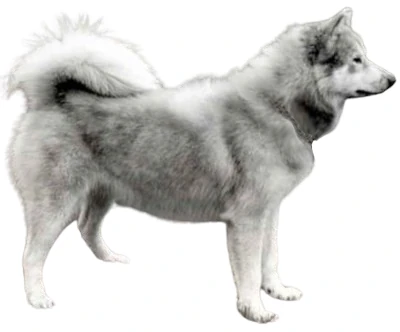
The American Eskimo Dog is a spitz-type breed originating from the United States, despite its misleading name. It is a popular companion dog known for its pristine white coat, playful nature, and remarkable intelligence.
The American Eskimo Dog is a small to medium-sized dog, elegant and well-proportioned. It has a well-shaped head with a pointed muzzle, almond-shaped eyes that range from brown to black, and triangular, erect ears. The most distinctive feature of this breed is its dense and thick coat, which is double-layered with a soft undercoat and a longer, stiffer outer coat. Its tail is well-furred and carried over the back in a curl.
The American Eskimo Dog comes in three sizes: toy, miniature, and standard. The toy size typically measures between 9 and 12 inches (23 to 30 cm) at the shoulder, the miniature between 12 and 15 inches (30 to 38 cm), and the standard between 15 and 19 inches (38 to 48 cm). The weight varies according to size, ranging from 5 to 35 pounds (2 to 16 kg).
The coat of the American Eskimo Dog is one of its most striking features. It is double-layered, with a dense undercoat that provides effective insulation and a longer, stiffer outer layer that gives this dog its fluffy appearance. The coat color is usually white, though cream shades are also accepted. Regular brushing is required to prevent matting and to maintain the beauty of its coat.
The American Eskimo Dog is known for its playful, affectionate, and loyal temperament. It is highly intelligent, making it easy to train, but it also has an independent personality that can sometimes manifest as stubbornness. It is very social and loves being surrounded by its family, often showing wariness towards strangers, which makes it a good watchdog. The American Eskimo Dog is also very energetic and enjoys activities that stimulate both its body and mind.
The American Eskimo Dog is generally a healthy breed, but like all breeds, it can be prone to certain health issues. Common conditions include hip dysplasia, cataracts, and some skin allergies. A balanced diet, regular exercise, and routine veterinary check-ups are essential to maintaining its health. Its average lifespan is between 12 and 15 years.

The American Eskimo dog is a small to medium-sized breed with a thick white coat and an elegant appearance. Known for its sharp intelligence and loyalty, it is easy to train and loves being around its family. This energetic dog is very playful and adapts well to family life as long as it gets daily exercise. The American Eskimo puppy has an affectionate and protective character and may be slightly wary of strangers, making it a good guard dog as well.
The price of an American Eskimo puppy generally ranges between 800 and 1,500 euros. This price may vary depending on the lineage, health certifications, and the breeder’s reputation. As with any puppy, it is essential to budget for regular veterinary expenses as well as grooming costs to ensure its long-term health and well-being.
The American Eskimo Dog is an intelligent and energetic breed, recognizable by its beautiful white coat and lively expression.
Its training should be firm but kind to channel its intelligence and sometimes strong-willed temperament.
Early socialization is essential to develop its sociable side and moderate its natural wariness of strangers.
Prefer positive reward-based methods, as this breed responds particularly well to positive reinforcement.
Incorporate mentally stimulating exercises to satisfy its high cognitive needs.
Its thick coat requires frequent brushing, an ideal time to strengthen your bond.
Vary activities to maintain its interest, as it's a lively dog that easily gets bored with routine.